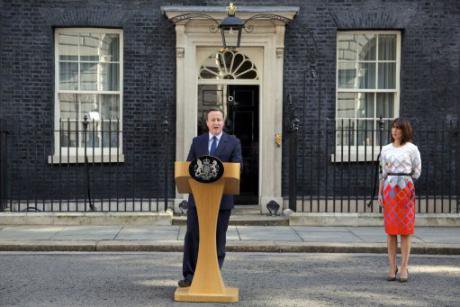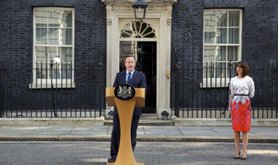
David Cameron announces his resignation after the shock Brexit vote. Paimages/Daniel Leal-Olivas. All rights reserved.On Thursday 23 June 2016 the Far Right achieved its most important victory in British electoral history. Its referendum campaign rode to victory on one issue, immigration.
The perception that “others” seize “British jobs”, drive down wages, and overburden public services dominated the campaign debate and overwhelmed all else. This was the revenge of the globalization losers and the marginalized, with their oppressors leading the charge.
Every prominent progressive supported EU membership, politicians, trade union leaders and media figures. Jeremy Corbyn (the first truly progressive leader of the Labour Party in decades) and his entire shadow cabinet defended continued EU membership. Every major trade union leader called for Remain, including the most progressive ones.
The suggestion that progressives, “the Left”, were split over the referendum represents no more than wishful thinking of a few fringe groups (for example the Communist Party of Great Britain Marxist-Leninist and the Socialist Workers Party).
Among those calling for Brexit, we find a role call of the far right. First and foremost is Nigel Farage and his BNP-lite UKIP. The economic programme of Farage and the Tory the Brexiteers is an extreme version of neoliberalism. Their objections to the European Union include regulations that protect consumers and workers (including The Charter of Fundamental Rights of the European Union), which in their view limit “free trade” and “free capital flow”.
The most shameless sham of the Brexiteers was their rhetoric fanning fears of immigration, while planning a post-referendum of programme of undermining the civil and human rights of the target group. Their strident anti-immigration message carried the subtext, “stop the immigrants lowering your earnings and undermining social services so we can do it more thoroughly by privatization and deregulation”.
Further down the road
The outcome of the EU referendum signals a fundamental change in British politics. To paraphrase Oscar Wilde, suddenly we have the unspeakable seeking control of the unimaginable, Boris Johnson and/or Michael Gove on the verge of state power.
Is it possible that this changing of the Tory guard from Right to Right-er (then Right-est?) creates the space for progressives to fill? Might the transitory disarray on the Right embolden and inspire the Left to action?
After such a major political shock one should be extremely cautious in venturing predictions of things to come. However, a process by which an electoral victory led by a country’s most right-wing politicians might energize the Left does not strike me as credible. Much credible is the opposite, a win by the Right strengthens the Right.
The election of Jeremy Corbyn as leader of the Labour Party is most important progressive change in the United Kingdom in decades. In place of berating the Tory government for creating the possibility of, then laying the basis for Brexit, the Parliamentary Blairites seize on referendum outcome to attack their popularly elected leader.
No sooner had the results of the referendum appeared on TV screens than the old guard of the Labour Party called for Corbyn’s overthrow, accusing him of causing the outcome.
With an eye to the split in the Labour Party the new Tory Prime Minister might hold a quick election to solidify power. This combined with a second Scottish independence referendum could deal a massive blow to progressive politics in what would be left of Britain.
All is not lost on 23 June, but quite a bit was.
Read more
Get our weekly email




Comments
We encourage anyone to comment, please consult the oD commenting guidelines if you have any questions.